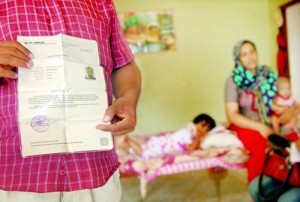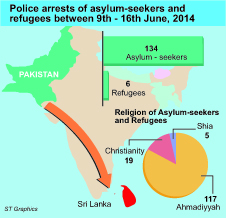News
Blame game over Pak asylum seekers
Uncertainty looms over the fate of the Pakistani asylum seekers who were arrested and are being detained at the Boossa Terrorist Investigation Department detention facility, amidst a blame game between the Government and the United Nations High Commissioner for Refugees (UNHCR).
Pointing out that any move by the Government to deport them would be “problematic”, the Office of the United Nations High

A Pakistani asylum seeker holds up the refugee status document issued by the UNHCR. Pic by Nilan Maligaspe
Commissioner for Refugees (UNHCR) said this week that it was not aware of the charges against these asylum seekers.
“We wish to reiterate that deporting them to Pakistan would be a violation of international refugee laws and principles,” said Igor Ivancic, the Senior Protection Officer at the UNHCR office. A request to visit the detainees is yet to be granted. However, the International Committee of the Red Cross (ICRC) was given access on June 20.
On June 9, the police together with the Department of Immigration and Emigration started arresting Pakistanis asylum seekers living in Negombo and Colombo. According to the UNHCR, 141 men were arrested in seven days.
“We did not even have a hint of what was coming,” Mr. Ivancic, who attends monthly meetings with government officials, said.
The majority of these Pakistani asylum seekers belong to the Ahmadiyya sect, regarded as apostate by the world’s Sunni Muslims. Among those who were arrested
are a few Christians and Shia Muslims. One of them is suffering from dengue and being held at the Mirihana Immigration and Emigration detention centre. The others are in Boossa.
The house-to-house search for Pakistani asylum seekers stopped on June 16. No charges have been pressed against the detainees. Neither have they been produced before a magistrate. The authorities say they are being held under immigration laws but declined to disclose specific allegations.
“You cannot target a group because you may have indication or knowledge that one or a few individuals from that group might have  some kind of background that was socially unacceptable,” Mr. Ivancic said.
some kind of background that was socially unacceptable,” Mr. Ivancic said.
The Immigration Department insists the men will be kept in detention until their cases are examined. “We will check their details and send them back,” Immigration Controller General Chulananda Perera said. “We have not accepted these people here and we have repeatedly made this clear to the UNHCR. We did not receive a single reply, not even an acknowledgement, to the written objections we raised.”
Under a 2006 working arrangement between the Government and the UNHCR, the Immigration Department can object to any individual being admitted to the country on grounds of national security, public order and Sri Lanka’s international commitments. Objections are discussed at a meeting between the External Affairs Ministry, the Department of Immigration and the UNHCR. UNHCR Representative Golam Abbass said he had “not received a single objection” in the eight months since he arrived in Sri Lanka.
In defence, Immigration Chief Perera said the Department had stopped sending objections because the UNHCR did not respond. In 2012, the Ministry of External Affairs had scheduled a meeting to resolve the deadlock but the refugee agency had pulled out, Immigration officials claimed.
Officials —including defence authorities —were deeply critical of what they alleged was the UNHCR’s role in swelling the population of asylum seekers in Sri Lanka. They said the refugee agency has “persistently ignored” their concerns.
In March 2013, Defence Secretary Gotabaya Rajapaksa at a discussion convened by him told UNHCR to consider establishing a safe house or welfare centre for asylum seekers pending their resettlement in a third country, a source said. The Defence Secretary had said the Government could not give economic support and asked the UNHCR to provide adequate facilities for the foreigners. These and other requests were reportedly disregarded, the source added.
The Controller General did not reveal what would happen to the family members of detainees. Defence Ministry sources said instructions had been given to reunite and deport them all. However, this is yet to happen. According to the UNHCR, there are no previous cases of Sri Lanka deporting asylum seekers.
On Thursday, hundreds of Pakistanis gathered at the Ahmadiyya mosque at Periyamulla in Negombo for the UNHCR to renew their papers. The process takes place every few months but this time the asylum seekers were nervous and agitated.
“We all feel so insecure,” said Jamila Rita, a Christian, who was a teacher. “Ten people were taken from the house which we are sharing. There was a very old man who had undergone open heart surgery. He begged them to spare him but they did not listen.”
The husband of 38-year-old Anila Imran, a Christian, is in Boossa. He was taken away even as his aged mother and their three sons pleaded with police to let him stay. The strain shows on her face. “Two or three times I go to the UNHCR office in Colombo,” she said. “I know nothing.”
“So far we have no idea what will happen to these people,” Ms. Rita said. “We have had no contact with them.” Some Pakistanis had sought safe haven elsewhere, returning to their rented homes only after the UNHCR assured them there would be no more arrests.
The worries of asylum seekers were exacerbated by loudspeaker announcements made in some areas of Negombo, asking residents not to accommodate foreigners. “The police went around by three-wheeler and said people must not give houses to Pakistanis,” said an asylum seeker outside the Negombo mosque. “Many of the rent agreements are six months to one year. They are coming to an end. Then where we will go?”
The police denied this but residents in Negombo, including the Catholic pastor of a prominent church, said they had heard the announcements. “Police said not to give houses to foreigners,” recalled a roadside fruit-seller. “Most houses in this area are rented by Pakistanis. They mind their own business but we do not know much about them.”
But others said there was resentment amongst many residents about the growing influx of Pakistanis. “They are a nuisance and must go back,” said a private sector employee, requesting anonymity. “Some of them even had a fight with drivers in our three-wheeler stand. There are too many of them now.”
New complications could arise if Sri Lankans, alarmed by the arrests and warnings, close their doors to the asylum seekers —leaving them with nowhere to go. One Pakistani Ahmadi woman, who is awaiting relocation to Canada after her refugee status was approved two years ago, said their landlady wanted her family to vacate at once.
She lives in Kudapaduwa with her husband and two children, one of whom is eight-months old. They arrived in Sri Lanka six years ago. In 2011, her husband was released after nine days of detention at Mirihana. Her sister, brother-in-law and their daughter share the lodgings. They arrived in 2013 and are still asylum seekers.
“House owner very dangerous,” the woman said, in broken English. “She beat me, umbrella. She throw shoes, stone. She say, you go, go, go. Where go? Everywhere problem. Very tension, sister.”
A sense of unease pervades the community. The Ahmadi Muslims have been instructed by their community leaders not to speak to the media. A school run by Christian asylum seekers in the premises of a church has been temporarily closed.
In the wake of the police swoop on the Pakistani asylum seekers, the UNHCR officials met defence and immigration authorities, but conflicting claims are being made as to what was agreed upon. The refugee agency says it was led to think “there is a possibility of discussing the release of certain categories of individuals in the group”.
These include six men who have already been granted refugee status by the UNHCR, a teenage boy and several persons with medical problems. “But since then we have not heard from the Government about the plan,” Mr. Ivancic said.
“Those are total lies,” National Intelligence chief Kapila Hendawitharana, who chaired the meeting. He said he had only instructed immigration officials to release a teenager in custody. He had also asked them to consider whether two differently-abled people among the detainees could be freed. “As for the others, I said, no, we can’t release them,” he said.
The UNHCR is maintaining contact with other asylum seekers through community leaders, mosques and churches. “The families are distressed that their fathers, husbands and sons have been taken away,” Mr., Ivancic said. “This level of anxiety comes as a result of a lack of information. They don’t know why this is happening, what the future will be or how the situation will be resolved.”

